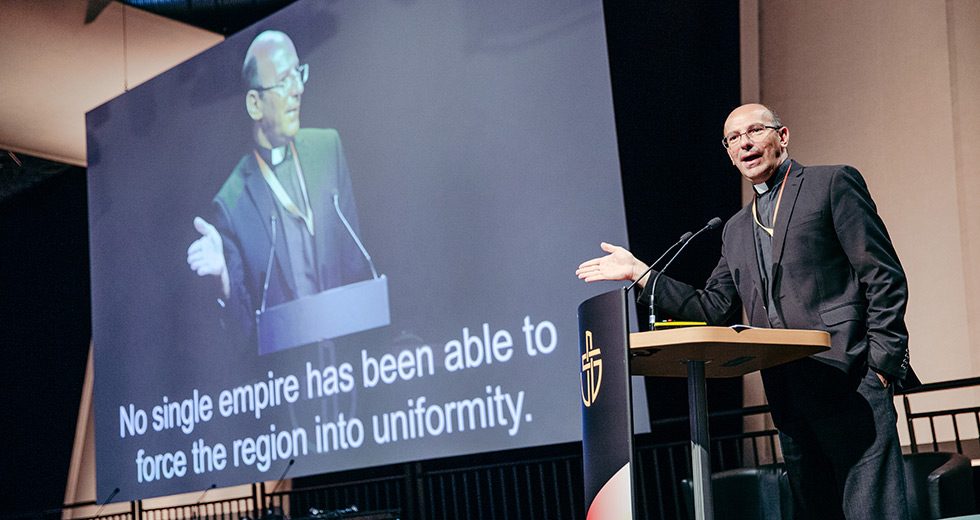Bible underlines the need to support diversity, says Palestinian Christian
Posted on July 6, 2017 by Phil Tanis

by Stephen Brown
The church worldwide will not survive if Christians in Africa, Asia and Latin America do not develop their own expressions of faith and theology, Palestinian Christian Mitri Raheb has told a global assembly of Reformed churches meeting in Leipzig, Germany.
“Dare to develop and tell your story—in Africa, in Latin America, in Asia,” said Raheb, who until June was pastor of the Evangelical Lutheran Christmas Church in Bethlehem.
“Without your story there is no universal church,” he said on 6 July at the General Council of the World Communion of Reformed Churches. “We cannot keep importing theologies from Europe.”
As well as new expressions of the Protestant faith in Africa, Asia and Latin America, there also needed to be new forms of expressing the faith in Europe, said Raheb.
He was speaking on a biblical passage (Acts 2:1-13) that recounts how the Holy Spirit allowed diverse peoples gathered in Jerusalem from all parts of the Roman Empire to understand each other although they spoke different languages.
“These diverse groups use their own native languages and do not adhere to the language of the empire,” said Raheb. “Their identities are respected and embraced. With all these diverse languages one would expect confusion, misunderstandings and even wars.”
Instead, he continued, “the Spirit provides a kind of a software, today we would say an app, a ‘voice translator’,” for translation and communication so that these groups could understand each other.
“In the Pentecost story the rich diversity of the region is embraced and celebrated. It is regarded as strength rather than a deficiency,” he continued. “The multiple identities of the region are viewed not as contradictions, but as a treasure to save.”
Those living in the Middle East understand that the church has to be pluralistic in nature, said Raheb, and no single empire over the centuries has been able to force the region into uniformity.
Instead the region has been home to different expressions of national churches—such as Copts, Syriac, Marinates or Greeks—each worshipping in their own native language and possessing a distinct cultural identity.
“God wants to speak to us in the languages in which we dream,” said Raheb.
“We have the promise of the spirit so let us to dare to write our own theology,” he said. “We can learn from each other, we can challenge each other but we need to be in communication with each other, to be in communion.”
The WCRC groups more than 225 Protestant churches with a combined membership of about 80 million Christians in Congregational, Presbyterian, Reformed, United, Uniting and Waldensian churches in over 100 countries. Its offices are in Hannover, Germany.
 World Communion of Reformed Churches
World Communion of Reformed Churches